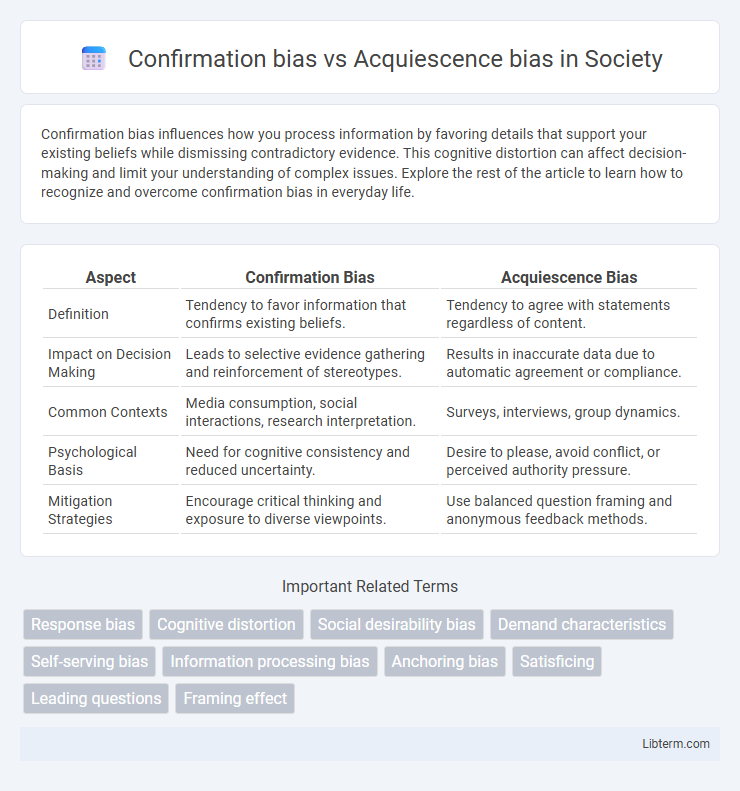Confirmation bias influences how you process information by favoring details that support your existing beliefs while dismissing contradictory evidence. This cognitive distortion can affect decision-making and limit your understanding of complex issues. Explore the rest of the article to learn how to recognize and overcome confirmation bias in everyday life.
Table of Comparison
| Aspect | Confirmation Bias | Acquiescence Bias |
|---|---|---|
| Definition | Tendency to favor information that confirms existing beliefs. | Tendency to agree with statements regardless of content. |
| Impact on Decision Making | Leads to selective evidence gathering and reinforcement of stereotypes. | Results in inaccurate data due to automatic agreement or compliance. |
| Common Contexts | Media consumption, social interactions, research interpretation. | Surveys, interviews, group dynamics. |
| Psychological Basis | Need for cognitive consistency and reduced uncertainty. | Desire to please, avoid conflict, or perceived authority pressure. |
| Mitigation Strategies | Encourage critical thinking and exposure to diverse viewpoints. | Use balanced question framing and anonymous feedback methods. |
Understanding Cognitive Biases: An Overview
Confirmation bias involves selectively seeking or interpreting information that supports preexisting beliefs, while acquiescence bias refers to the tendency to agree with statements regardless of content, often influenced by social desirability or survey design. Understanding these cognitive biases is crucial in research and decision-making to avoid distorted data interpretation and flawed conclusions. Recognizing their impact enables more accurate analysis and encourages critical thinking in evaluating evidence and survey responses.
Defining Confirmation Bias
Confirmation bias is the tendency to interpret, favor, and recall information that confirms preexisting beliefs or hypotheses while disregarding contradictory evidence. This cognitive bias influences decision-making by reinforcing existing attitudes, leading individuals to selectively gather or remember information. In contrast, acquiescence bias refers to the tendency to agree with statements or questions regardless of their content, often affecting survey responses and data accuracy.
Defining Acquiescence Bias
Acquiescence bias, also known as agreement bias, occurs when respondents tend to agree with statements regardless of their content, skewing survey or research results. This bias differs from confirmation bias, where individuals favor information that confirms their preexisting beliefs while disregarding contradictory evidence. Understanding acquiescence bias is crucial in designing unbiased questionnaires and accurately interpreting subjective data.
Key Differences Between Confirmation and Acquiescence Bias
Confirmation bias involves the tendency to seek, interpret, and remember information that confirms pre-existing beliefs, leading to skewed evidence evaluation. Acquiescence bias manifests as the propensity to agree with statements or questions regardless of content, often influenced by social desirability or perceived authority. The key difference lies in confirmation bias being a cognitive filter reinforcing prior beliefs, whereas acquiescence bias is a response style driven by compliance or conformity pressures.
Psychological Roots of Confirmation Bias
Confirmation bias originates from the psychological need to maintain cognitive consistency and reduce mental discomfort, leading individuals to favor information that confirms their preexisting beliefs. This bias is reinforced by selective exposure, interpretation, and memory processes that filter out contradictory evidence. Acquiescence bias, by contrast, stems from social conformity pressures and a tendency to agree with statements regardless of content, driven by a desire for social approval and avoidance of conflict.
Psychological Roots of Acquiescence Bias
Acquiescence bias, or the tendency to agree with statements regardless of content, stems from psychological roots such as social conformity, cognitive ease, and the desire to avoid conflict or gain approval. This bias often arises because agreeing requires less cognitive effort than critically evaluating each item, reflecting an automatic response pattern shaped by social and cognitive factors. In contrast, confirmation bias involves selectively processing information to support preexisting beliefs, highlighting differing cognitive mechanisms underlying these biases.
Real-World Examples: Confirmation Bias in Action
Confirmation bias is evident when individuals seek information that supports their preexisting beliefs, such as investors ignoring negative market data to reinforce optimistic forecasts. In politics, supporters often selectively consume news aligning with their views, reinforcing partisan divisions. This contrasts with acquiescence bias, where respondents may agree with survey questions regardless of content, skewing data reliability in social science research.
Real-World Examples: Acquiescence Bias in Action
Acquiescence bias frequently appears in market research surveys where respondents tend to agree with statements regardless of their true opinions, skewing data and leading to misleading conclusions. For instance, customer satisfaction surveys often show inflated positive ratings because participants feel pressured to conform or appear agreeable. This contrasts with confirmation bias, where individuals selectively gather or interpret information to reinforce pre-existing beliefs rather than acquiescing to survey prompts.
Impacts on Research and Decision-Making
Confirmation bias leads researchers and decision-makers to selectively gather and interpret information that supports preexisting beliefs, often resulting in skewed data analysis and flawed conclusions. Acquiescence bias causes survey respondents to agree with statements regardless of content, compromising the validity of collected data and weakening the reliability of research findings. Both biases undermine the objectivity and accuracy of decision-making processes by distorting evidence evaluation and data interpretation.
Strategies to Minimize Both Biases
Effective strategies to minimize confirmation bias include actively seeking out contradictory evidence and encouraging diverse perspectives during decision-making. To reduce acquiescence bias, designing surveys with balanced question phrasing and employing neutral wording helps prevent respondents from consistently agreeing. Combining these approaches enhances data accuracy and leads to more reliable conclusions in research and analysis.
Confirmation bias Infographic

 libterm.com
libterm.com